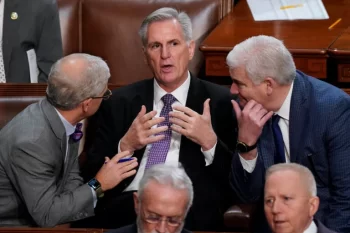The House Speaker 2023 battle has taken an unexpected and controversial turn, with nine candidates at the center of attention.

These individuals have not only refused to acknowledge Joe Biden as the legitimate President but also voted to overturn the 2020 election results, which confirmed Biden’s victory. This development highlights the continued presence of the “big lie” that former President Donald Trump won the 2020 election, despite overwhelming evidence to the contrary.
The refusal of these nine candidates to recognize Joe Biden as the President of the United States is emblematic of the deep divisions and polarization that have characterized American politics in recent years. It underscores the persistence of the false narrative that the 2020 election was rigged or stolen, a claim that has been debunked and discredited by numerous courts, election officials, and independent audits. The candidates’ refusal to accept the election results is a demonstration of their commitment to the Trumpist faction of the Republican Party, which has remained loyal to the former President even after his departure from the White House.
The House Speaker’s position is one of great significance and influence within the U.S. Congress. The Speaker is responsible for presiding over the House of Representatives, setting the legislative agenda, and representing the House to the President and the Senate. Given the importance of this role, the battle for the position has garnered widespread attention and scrutiny.
The nine candidates who have refused to accept Joe Biden’s presidency and supported efforts to overturn the election results are seen as aligned with the Trump wing of the Republican Party. Their actions reflect the broader schism within the GOP, with one faction committed to Trump’s leadership and the promotion of baseless claims about election fraud, while another faction seeks a more traditional and principled conservative approach to governance.
The continuation of the “big lie” that Trump won the 2020 election, despite all evidence to the contrary, has raised concerns about the health of American democracy. The peaceful transfer of power is a foundational principle of the U.S. political system, and disputing the legitimacy of election outcomes can have far-reaching consequences. It undermines public trust in the electoral process, erodes the foundation of democratic institutions, and can incite political violence, as witnessed in the events of January 6, 2021, when a mob of Trump supporters stormed the U.S. Capitol.
It is important to note that the 2020 election was one of the most secure and well-documented in American history. Multiple audits, court rulings, and investigations confirmed the accuracy and integrity of the results. Additionally, election officials from both parties, including Republican officials, played a pivotal role in ensuring a fair and transparent electoral process.
The refusal to acknowledge the legitimacy of the 2020 election results by these nine House Speaker candidates raises questions about their commitment to the democratic principles and norms that underpin the American political system. It also highlights the challenges facing the Republican Party in a post-Trump era. While Trump retains a strong and vocal base of support within the party, there are voices calling for a return to a more traditional conservatism that is rooted in policy and ideology rather than personality and loyalty.
The House Speaker 2023 battle, with these nine candidates at its center, serves as a microcosm of the broader struggle within the GOP. It raises important questions about the direction of the Republican Party and the future of American democracy. The outcome of this contest will not only determine the leadership of the House of Representatives but also send a signal about the state of the Republican Party and its commitment to the principles of democracy, the rule of law, and the peaceful transfer of power.



